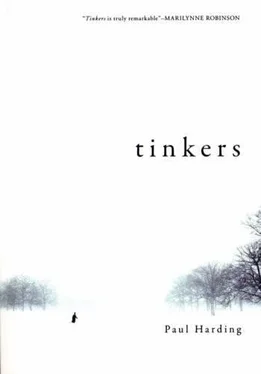Howard resented the ache in his heart. He resented that it was there every morning when he woke up, that it remained at least until he had dressed and had some hot coffee, if not until he had taken stock of the goods in his brush cart, and fed and hitched Prince Edward, if not until his rounds were done, if not until he fell asleep that night, and if his dreams were not tormented by it. He resented equally the ache and the resentment itself. He resented his resentment because it was a sign of his own limitations of spirit and humility, no matter that he understood that such was each man's burden. He resented the ache because it was uninvited, seemed imposed, a sentence, and, despite the encouragement he gave himself each morning, it baffled him because it was there whether the day was good or bad, whether he witnessed major kindness or minor transgression, suffered sourceless grief or spontaneous joy.
This morning-the Monday morning after the Friday morning when there was predawn snow and Howard had stopped to look at a field that had once been a homestead and had, in a fugue state, made a contraption out of twigs and grass and flowers, which he had already forgotten making, and then had had a seizure and awoke freezing in the field and had finally realized who he was and where he was and had made his way home-this morning brought fear that there hid somewhere on one of the back roads that he intended to canvass another seizure, a bolt of lightning coiled behind a rock or stump or within the hollow of a tree or some strange nest and which his passing would trigger to spring, to explode, and to impale him.
Such vanity! What gall to elect for yourself such attention, good or bad. Project yourself above yourself. Look at the top of your dusty hat: cheap felt, wilted and patched with scraps from the last wilted and patched felt hat. What a crown! What a king you are to deserve such displeasure, how important that God stop whatever it is He is tending and pitch bolts at your head. Rise higher, above the trees. Your crown is already hard to see amid the dust of the road and dirt of the ditch. But you are still remarkable. Rise higher, perhaps to the height where the blackbirds flap. Where have you gone? Oh, there you are, I think. That is you, isn't it, that wisp inching along? Well, rise higher, then, to the belly of the clouds. Where have you gone? Now higher, to where, if you are not careful, you might stub your toe on the mountains of the moon. Where are you? Never mind you; where is your home, your county, your state, your nation? Ah, there it is! And higher now, so that your hair and the lashes of your eyes catch fire from the sparks of solar flares. On which of those bright bodies do you rule your kingdom of dirt, your cart of soap? Very well, that one. I hope you are right-there is little need for a tinker on Mars. Now higher again, past the eighth planet, named for the king of the sea. And higher again, past the shadowy ninth, which for now only exists in the dreams of men back on- Well! Where have you gone? Which among those millions of glittering facets is where you belong? Where is it you toil and drum and fall to the ground and thrash in the weeds?
The weather turned warm and on Sundays after church the family sat on the porch. The porch ran the length of the front of the house and was surrounded by a thick collar of wildflowers. In early July, there was Queen Anne's lace and columbines, hawkweed and forget-me- nots, black-eyed Susans and bluebells. There was a bank of loosestrife in the crabgrass and clover across the lawn, between the porch and the verge of the road. The floor of the porch was uneven and ran at a slight incline from one end (where the front door was) to the other (just past the window, through which the dining room table was visible). Looked at from the road, the house appeared to lean toward the left and the porch to the right, so that it appeared the only thing keeping either standing was their mutual pull on each other. From the side of the house, though, it seemed that the opposite was true, that they slumped against one another and remained upright by virtue of their mutual weight. Viewed from whatever angle, the homestead had the look of claptrap. The walls all seemed as if they were about to fall over, one upon the next, and the sagging roof to drop on top of the pile, so that the flattened house would make a neat stacked deck.
The porch was unpainted and its wood bleached to a silvery white. When the sky filled with clouds, it often turned the same silver color as the wood, so that it only seemed missing a grain to be wood and the wood only missing a breath of wind to stir it and turn it into sky. There was a spot on the floor, just to the right of the front door, which, when walked on, made the whole porch bob as if it rested on a branch. There were two decrepit chairs, one an old rocking chair, which had once been painted red, and in which Kathleen sat and shelled peas or snapped beans and barked, Get where I can see you, at Joe, who was rolling around in the side lot. Howard sat in the other chair. It was old, with a ladder back, which made a parallelogram with the floor and listed to one side or the other, according to how Howard sat on it, and the back of which came apart at the splats, so that he had to stand every couple of minutes and clap the piece of furniture back together. The children sat on upended buckets or on packing crates. Buddy the Dog and Russell the Cat lay on patches of sun. Darla and Marjorie helped Kathleen: Marjorie when she was not upstairs in bed, suffering from an asthma attack brought on by pollen and ragweed, and Darla when she did not see a wasp or spider which, sooner or later, she always did, and which sent her shrieking back into the house, as often as not over the springy part of the floor, so that the rest of the family was left to steady themselves on the swaying porch as she fled to the hollow depths of the house. Howard and George played cribbage.
Seven.
Fifteen for two.
Twenty-four for three.
Thirty for four.
Go.
Thirty-one for two.
They played without a board and kept score by adding their points in the margins of the comics pages from the newspaper. Father said, George, I can't find the cribbage board, and I said, That's funny, Daddy; it should be on the porch, where we left it. 1 pretended to help him look for it for an hour until he gave up and 1 pretended to and we used a piece of old newspaper to keep score. I took the board. I stole it and took it to Ray's shed, where we smoked and played cribbage for marbles or an arrowhead.
You missed a fifteen, and the right jack is three more.
So it is. You got me again, George.
I smell a skunk, a double skunk.
Kathleen said, George, go get your brother. Go get him.
No looking.
I won't. George got off the crate.
Walk. So he walked. He turned the corner of the house and called for his brother and when he saw him, stuck in a tree and gnawing on a handful of flowers, he picked up a pebble and threw it at him. The stone struck Joe on the ear and he began to cry. George said, loudly enough for his mother and father to hear around the corner, 0, Joe, don't cry. I'll get you out of there. Joe, don't cry. I'll get you some water to wash out the bitter taste of starflowers and daisies.
What of miniature boats constructed of birch bark and fallen leaves, launched onto cold water clear as air? How many fleets were pushed out toward the middles of ponds or sent down autumn brooks, holding treasures of acorns, or black feathers, or a puzzled mantis? Let those grassy crafts be listed alongside the iron hulls that cleave the sea, for they are all improvisations built from the daydreams of men, and all will perish, whether from ocean siege or October breeze.
And what of barges made to burn? One evening at sunset, as he was walking through the woods near the house after dinner, Howard caught sight of George kneeling on a path, examining something on the ground. George did not hear him, so Howard stood quietly in the trees and watched his son. George rose and hurried back up the path toward the house. He ran out of Howard's view and a moment later the door to the front porch slapped shut. Howard went to where his son had knelt and found a dead mouse, curled as if sleeping, on the leaves. It had not been dead for long. Its head went back and its limbs opened up when Howard toed it with his boot, after which it curled back up again. The porch door swung shut again and Howard stepped back into the shadows in the trees.
Читать дальше












